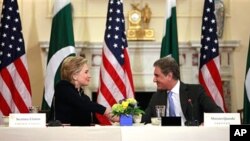Security, economy, energy, communications and what U.S. Secretary of State Hillary Rodham Clinton referred to as "kitchen table" issues were all up for discussion in the first ever ministerial level strategic dialogue between the U.S. and Pakistan, which generated important momentum in efforts to create a results-oriented partnership for the future.
Secretary Clinton joined her counterpart, Pakistani Foreign Minister Shah Mahmood Qureshi along with panels of senior representatives from both countries during the historic two-day meeting:
"With this dialogue, we want to think about security in the broadest possible terms – not just what we commonly think of as national security, but the full range of political, economic and social issues that shape the daily life of people everywhere."
"Here in the United States, said Secretary Clinton, "Families across our country often gather around the kitchen table to discuss them."
Noting that some 60 to 70 percent of Pakistanis rely on agriculture for their daily living, the 2 countries agreed to take concrete steps to boost exports of agriculture and improve agricultural infrastructure. Secretary Clinton said the U.S. administration would work toward greater U.S. market access for Pakistani products. The 2 countries also discussed the creation of a fund to support increased foreign direct investment in Pakistan.
The U.S. signed a letter of intent to upgrade significant road infrastructure in the Northwest of Pakistan, and discussion was continued on new water projects, including a project through which the U.S. will help fund farmers in Pakistan as they update wells.
Secretary Clinton said the 2 countries discussed ways to improve Pakistani citizens' access to affordable and reliable power. During the meeting, USAID signed an implementation agreement that furthers the initiatives of the Signature Energy Program. The program funds the rehabilitation of 3 thermal power stations in Pakistan, and helps with other power grid improvements.
Security remained an important part of the discussion and Secretary Clinton reaffirmed the U.S. commitment to stand with Pakistan as it confronts violent extremism. The U.S. administration plans to work with Congress to develop a multiyear security assistance package that will include foreign military financing, said Secretary Clinton.
"The United States comes to this dialogue with great respect for the nation and people of Pakistan," said Secretary Clinton. "We recognize the central role that Pakistan plays in promoting security and prosperity."
U.S. - Pakistan Strategic Dialogue

"The United States comes to this dialogue with great respect for the nation and people of Pakistan," said Secretary Clinton.



